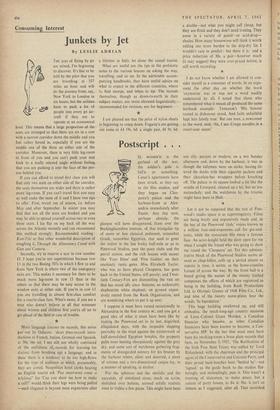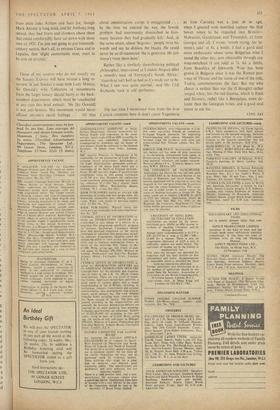Postscript . .
WITHER'D is the garland of the war, the soldier's pole is fall'n or something. Caesar's apartments have been struck, as they say in the film studios, and they began on Cleo- patra's palace and the harbour-front at Alex- andria immediately after Easter. Any day now, perhaps already, the glimpse will have disappeared, from over the Buckinghamshire treetops, of that triangular tip of more or less classical pediment, somewhat Greek, somewhat Egyptian, that used to greet the visitor in the last bosky half-mile or so to Pinewood Studios, past the pony clubs and the petrol station, and the rich houses with names like 'Four Elms' and 'Five Gables' on their resolutely rustic gates. Miss Elizabeth Taylor, who was to have played Cleopatra, has gone back to the United States, still poorly; and Twen- tieth Century-Fox are dismantling the vast set that has stood idly since Autumn, an undeniably elephantine white elephant, on ground expen- sively rented from the Rank Organisation,'and are wondering where to put it up next.
I suppose it must have rained occasionally in Alexandria in the first century BC, and you got a good idea of what it must have been like by visiting the Pinewood set in its last, dispirited, dilapidated days, with the tarpaulin slapping peevishly in the wind against the timberwork of half-demolished Egyptian temples, the property palm trees leaning obsequiously against the grey sky, and some sort of watchman gathering frag- ments of disregarded scenery for his brazier by the harbour where, silent and deserted, a piece of trireme and a two-dimensional calque lay, in a manner of speaking, at anchor.
For the sphinxes and the obelisks and the caryatids, of simulated stone, stuck on scrim, stretched over battens, seemed solidly realistic even to within a few paces. This might have been any city, ancient or modern, on a wet Sunday afternoon and, down by the harbour, it was as though the tallymen were on strike, having lit- tered the docks with their cigarette packets and their chocolate-bar wrappers before knocking off. The palace in its square looked a bit like the middle of Liverpool, cleaned up a bit, but no less melancholy; and the watchman by the trireme might have been in Hull.
* Let it not be supposed that the rest of Pine- wood's studio space is as supererogatory. Films are being busily and expensively made and, in the bar of the Pinewood 'club,' voices known to a million four-and-sixpennies call for gin-and- tonic, while the restaurant fills many a famous face. An actor-knight held the door open for me when I sought the friend who was going to show me round the 'Cleopatra' set. Yet this adminis- trative block of the Pinewood Stiklios seems al- most as chap-fallen, calls up a period almost as remote in time, it seems, as the home-counties Levant of across the way. By the front hall is a board giving the names of the twenty limited companies the offices of which are registered as being in the building, from Rank Productions Ltd. to Olympic Games of 1948 Film Co., Ltd., and nine of the twenty name-plates bear the words, 'In liquidation.'
This huge building swallowed up, and still embodies, the mock-long-ago country mansion of Lieut.-Colonel Grant Morden, a Canadian financier who became, as other Canadian financiers have been known to become, a Con- servative MP. In the bar that must once have been his smoking-room a brass plate records that here, on November 3, 1921, 'The Ratification of the Irish Free State Treaty was settled by' Lord Birkenhead, with the chairman and the principal agent of the Conservative and Unionist Party, and their proud back-bencher host. 'Settled by'—not 'signed,' as the guide book to the studios flat- teringly, and misleadingly, puts it. This wasn't a meeting of statesmen, to make peace, but a caucus of party bosses, to fix it. No, it isn't so remote as I suggested, after all. That tarnished
brass plate links Actium and Suez for, though Mark Antony is long dead, and Sir Anthony long retired, they had fixers and climbers about them that could comfortably have sat down with those men of 1921. I'm just not going to put twentieth- century names, that's all, to envious Casca and to Lepidus, that `slight unmeritable man, meet to be sent on errands.'
Those of my readers who do not usually see the Sunday Express will have missed a long in- terview in last Sunday's issue with Lady Mosley, Sir Oswald's wife. Collectors of moonbeams from the larger lunacy should hurry to the back- numbers department; others must be vouchsafed at any rate this brief extract: 'He [Sir Oswald] is not anti-Semitic. His movement would never
affront anyone's racial feelings. . All that about concentration camps is exaggerated . . . by the time we entered the war, the Jewish problem had enormously diminished in Ger- many because they had gradually left.' And, in the same strain, about Negroes: 'people twist his words and say he dislikes the blacks. He could never be so ill-mannered. He is generous. He just doesn't want them here.'
Rather like a similarly deep-thinking political philosopher, interviewed at London Airport after a month's tour of Verwoerd's South Africa: 'Aparthcit/ isn't half as bad as it's made out to be. What, 1 saw was quite normal,' said Mr. Cliff Richards. 'rock 'n' roll' performer.
The last time I mentioned w ine from the Iron Curtain countries here (I don't count Yugoslavia
as Iron Curtain) was a year or so ago, when I greeted with modified rapture the first Soviet wines to be imported into Britain- M ukuzani, Gurdzhaani and Tsinandali, all from Georgia and all, I wrote, 'worth trying, for in- terest's sake' at Ss. a bottle. I feel a good deal more enthusiastic about some Bulgarian wine I tasted the other day, now obtainable through any wine-merchant (I am told) at 7s. 6d. a bottle, from Beaufoys of Isleworth. Wine has been grown in Bulgaria since it was the Roman pro- vince of Thrace, and the name of one of the reds, Trakia, commemorates the fact. But my own choice is neither that nor the (1 thought) rather insipid white, but the red Gamza, which is fresh and tlavoury, rather like a Beaujolais, more de- licate than the Georgian wines, and a good deal easier to ask for.
Cl RIF. 11/Y







































 Previous page
Previous page